

Briefing paper on the MFF - Jan 2013. NGOs call on Irish Govt to defend EU aid. Money talks: February summit will set EU priorities for the long term. 16/01/2013 at 8:10 am On 7-8 February, European leaders will meet in Brussels to seek to reach a deal on the bloc’s next seven-year budget.
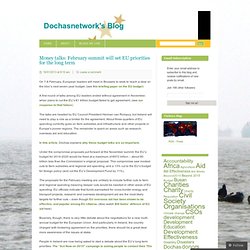
EU member states to set future budget, and priorities, for European Union. 27/07/2011 at 5:04 pm In April, Dóchas called on the European Union to take decisive action on the fight against poverty.
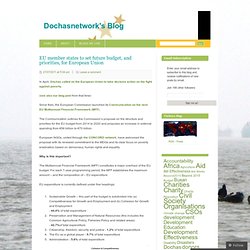
(see also our blog post from that time) Making the right strategic decisions for Europe. European leaders negotiating the bloc’s budget must not lose sight of the project’s overarching purpose, argues Hans Zomer WHEN EU leaders come together on Nov 22, they have one topic to discuss — the shape of the EU budget and the continent’s priorities for seven years up to 2020.
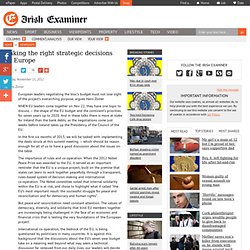
And in these talks there is more at stake for Ireland than the bank debts, as the negotiations come just weeks before Ireland takes up the Presidency of the Council of the EU. In the first six months of 2013, we will be tasked with implementing the deals struck at this summit meeting — which should be reason enough for all of us to have a good discussion about the issues on the table. The importance of rules and co-operation: When the 2012 Nobel Peace Prize was awarded to the EU, it served as an important reminder that the EU is a unique project, built on the premise that states can learn to work together peacefully, through a transparent, rules-based system of decision-making and international co-operation.
What you should know about the EU budget. EU budget 2014-2020 · Issues and themes · Bond. Multiannual financial framework 2014-2020. About the Multiannual Financial Framework The multiannual financial framework is a spending plan that translates the EU priorities into financial terms.
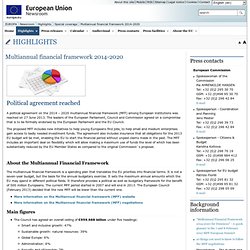
It is not a seven-year budget, but the basis for the annual budgetary exercise. It sets the maximum annual amounts which the EU may spend in different political fields. It therefore provides a political as well as budgetary framework for the benefit of 500 million Europeans. The current MFF period started in 2007 and will end in 2013.
Main figures The Council has agreed an overall ceiling of €959.988 billion under five headings: Smart and inclusive growth: 47% Sustainable growth: natural resources: 39% Global Europe: 6% Administration: 6% Security and citizenship: 2% The commitment ceiling amounts to 1.00% of EU gross national income (GNI) compared to 1.12% for the 2007-2013 MFF. Roadmap June 2011: Commission adopts basic legislative proposals concerning MFF. Multiannual Financial Framework 2014-2020. Commission updates its Multiannual Financial Framework proposal with latest data. European Commission Press release Brussels, 6 July 2012 Commission updates its Multiannual Financial Framework proposal with latest data The Commission adopted today its amended proposal for the 2014-2020 Multiannual Financial Framework (MFF).
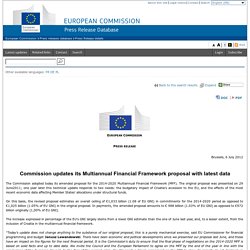
The original proposal was presented on 29 June2011; one year later this technical update responds to two needs: the budgetary impact of Croatia's accession to the EU, and the effects of the most recent economic data affecting Member States' allocations under structural funds. On this basis, the revised proposal estimates an overall ceiling of €1,033 billion (1.08 of EU GNI) in commitments for the 2014-2020 period as opposed to €1,025 billion (1.05% of EU GNI) in the original proposal. Cyprus presidency to start collecting wish lists for EU budget.
The Cyprus EU presidency will start consultations next week (9-15 July) with all member states on the next long-term EU budget, the country’s deputy minister to the president for EU affairs said yesterday (2 July). Andreas Mavroyannis gave a taste of the successive steps and expected difficulties in agreeing the Multiannual Financial Framework, or MFF, for 2014-2020.
The minister made reference to last week’s EU summit that decided that an agreement on MFF should be reached by the end of 2012. Before the summit, the Cyprus presidency had only said that it hoped to make as much progress as possible on MFF and achieve a “political agreement”, leaving the final work to the Irish EU presidency starting in January 2013. EU proposes increase in Aid. Myths and facts about EU budget and external cooperation. Currently, when EU institutions are working on the new financial framework 2014-2020, let's take a look how the EU budget makes Europe count in the world.
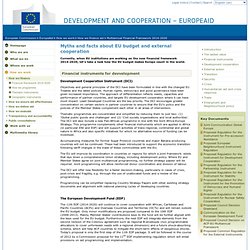
Financial instruments for devvelopment Development Cooperation Instrument (DCI) Objectives and general principles of the DCI have been formulated in line with the changed EU Treaties and the latest policies. Human rights, democracy and good governance have been given increased importance. The approach of differentiation reflects needs, capacities and performance of partner countries, and targets EU development cooperation where it can have most impact: Least Developed Countries are the key priority. Thematic programmes are concentrated and simplified by reducing them to just two: (1) 'Global public goods and challenges' and (2) 'Civil society organisations and local authorities'.
Accompanying measures for former Sugar Protocol countries and major Banana producing countries will not be continued. CONCORD recommendations on External Action. Plan EU on MFF. Concord info on MFF. Concord on MFF. EU foreign policy spending must be better targeted and scrutinised by Parliament. EU foreign policy spending after 2013 must reflect the EU's political ambitions and be resource-efficient, effective and democratically accountable, said foreign affairs committee MEPs on Monday and Tuesday in votes on geographic and thematic funds for the EU's external action. "The financing instruments for 2014-2020 are key tools for the promotion of the Union's objectives and values in the world, based on democracy, the rule of law and human rights.
The European Parliament does not want to be involved in their micro-management. However, as co-legislator for these instruments and as budgetary authority, it will insist on democratic control of their implementation and on the same rights as the other legislator, the Council"," said Elmar Brok (EPP, DE), chair of the foreign affairs committee and rapporteur for the regulation on common rules for the implementation of the EU's external financing instruments. Measurable objectives and involvement of civil society Partnership Instrument (PI)
EU budget talks end without accord - The Irish Times - Fri, Nov 09. Dóchas response to breakdown of negotiations. Separate Humanitarian Budget? VOICE members lobby for separate humanitarian aid budget line The discussions for the next Multi-Annual Financial Framework (MFF; EU budget after 2013) have started.
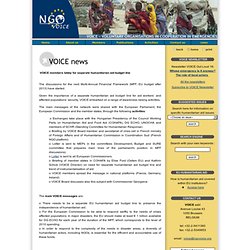
Given the importance of a separate humanitarian aid budget line for aid workers’ and affected populations’ security, VOICE embarked on a range of awareness raising activities. Draft Budget 2013: Investing in growth and jobs - Financial Programming and Budget. The EU's draft budget for 2013, presented today by the Commission, reflects the European Council's statements that growth and employment in the EU can only be achieved by combining fiscal consolidation and investment into future growth.
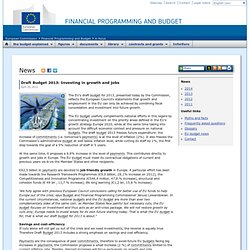
The EU budget usefully complements national efforts in this regard by concentrating investment on the priority areas defined in the EU's growth strategy Europe 2020, while at the same time taking into account the difficult economic context and pressure on national budgets. The draft budget 2013 freezes future expenditure: the increase of commitments (i.e. tomorrow's payments) is at the level of inflation (2%).
It also freezes the Commission's administrative budget at well below inflation level, while cutting its staff by 1%, the first step towards the goal of a 5% reduction of staff in 5 years. At the same time, it proposes a 6.8% increase in the level of payments. This contributes directly to growth and jobs in Europe. What next? For more information.